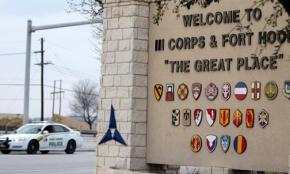A PTSD tragedy at Fort Hood
On April 2, Army Specialist Ivan Lopez began firing indiscriminately at other soldiers at Fort Hood in Texas. In all, four were killed (including Lopez) and 16 wounded in the second mass shooting at the base since 2009. According to reports, Lopez may have been agitated over a dispute regarding a request for leave to deal with family matters. But what is still not fully known is the extent to which the stresses of Army life may have exacerbated the post-traumatic stress disorder (PTSD) that Lopez reportedly suffered from.
In a statement released on April 4, staff members from explain why the official story about the Fort Hood shooting comes up short--just like the care given to veterans and service members.
LAST NIGHT, President Obama stated that he is "heartbroken" about the shooting on Fort Hood Army base in Killeen, Texas. We, too, are heartbroken, because this shooting could have been prevented.
The United States military is an institution that teaches us to devalue the lives of others and to devalue ourselves. When combat stress and other injuries are added to that environment, the result is volatile.
Fort Hood's base commander, Gen. Mark Milley, would like us to believe that this incident is about one unique individual and his inability to shoulder the stress of combat. Based on our own experiences and four years of extensive research and analysis, we are well aware that there is nothing particularly unique about Ivan Lopez's story. A full report on this research will be released next month on Memorial Day.
When we first went to Killeen in 2010, we met with many soldiers who were suffering from Traumatic Brain Injuries (TBI) and Post Traumatic Stress Disorder (PTSD) from combat and from sexual trauma. Instead of being treated, their commanders overturned their doctors' orders and sent them back to war. In some cases, those who reported these injuries were punished or given bad discharges, which create a permanent barrier to care. It is no wonder that this phenomenon manifests as rage and violence. We cannot allow this to continue--U.S. service members must be provided the right to heal from the invisible wounds of war.

Lopez was already being treated for common symptoms of PTSD--anxiety, depression, and insomnia--and was being evaluated for PTSD. Even after his death, the leadership at Fort Hood is going out of their way to deny any relationship between Ivan Lopez's mental health and his actions. The army claims that PTSD is difficult to diagnose. It would be much more accurate to say that it's difficult for veterans and service members to get a diagnosis from a military or Veterans Administration (VA) doctor.
The U.S. government and the Department of Defense are doing everything they can to avoid paying--whether in dollars or labor--for the invisible injuries they have caused to those they use to fight on their behalf. The number of U.S. service members who suffer from PTSD due to (often concurrent) deployments ranges from 20-50 percent, depending on the source. A lifetime of care for that many veterans is incredibly expensive. Affirming high numbers of incidences of PTSD requires acknowledging that trauma is a common and normal response to war, not a unique and individualized affliction that results from personal weakness and failure.
We collected testimony from 31 soldiers during our time at Fort Hood and are confident that these experiences are quite common. One of these soldiers, Rebekah Lampman, testified about attempting to get mental health support and justice after being sexually assaulted near the end of her seven years at Fort Hood. She stated, "I went and did everything I possibly could to advocate for myself. And I was getting the run-around, people were telling me that they were working on it, and the paperwork was delayed. They just gave me excuses. And in the meantime, they kept reprimanding me for my emotions and my actions and for everything."
As long as soldiers continue to be punished for seeking care, tragedies will continue to occur.
We must demand the right to heal.
In Solidarity,
Joyce, Matt, Maggie, and Julia
IVAW Staff
P.S. Our work at Fort Hood over the years would not be possible without Under the Hood Cafe and Outreach Center. They continue to play a vital role to the local community in the wake of this tragedy. A portion of all donations received by IVAW today will be donated to Under the Hood. Please consider making a generous donation so that we can continue to do this important work together.
First published at Iraq Veterans Against the War.


